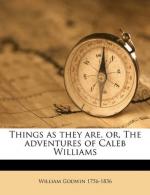|
This section contains 6,420 words (approx. 22 pages at 300 words per page) |

|
SOURCE: Miller, Jacqueline T. “The Imperfect Tale: Articulation, Rhetoric, and Self in Caleb Williams.” Criticism 20, no. 4 (fall 1978): 366-82.
In the following essay, Miller examines Godwin's theory of language as set forth in his essay on political justice and his application of that theory in the novel Caleb Williams.
Recent criticism of Caleb Williams generally concentrates on the theme of mastery and victimization, placing it in political, psychological, or theological contexts.1 These studies provide useful perspectives, but Godwin himself extended this concept of authority and oppression to include the domain of language and aesthetics, and it is here that we can locate a crucial but largely ignored dimension of the novel. From the book emerges an idea of language that equates words and things, defining the self and the world as basically linguistic constructs which are shaped, manipulated and controlled by those who possess the most powerful and persuasive...
|
This section contains 6,420 words (approx. 22 pages at 300 words per page) |

|


